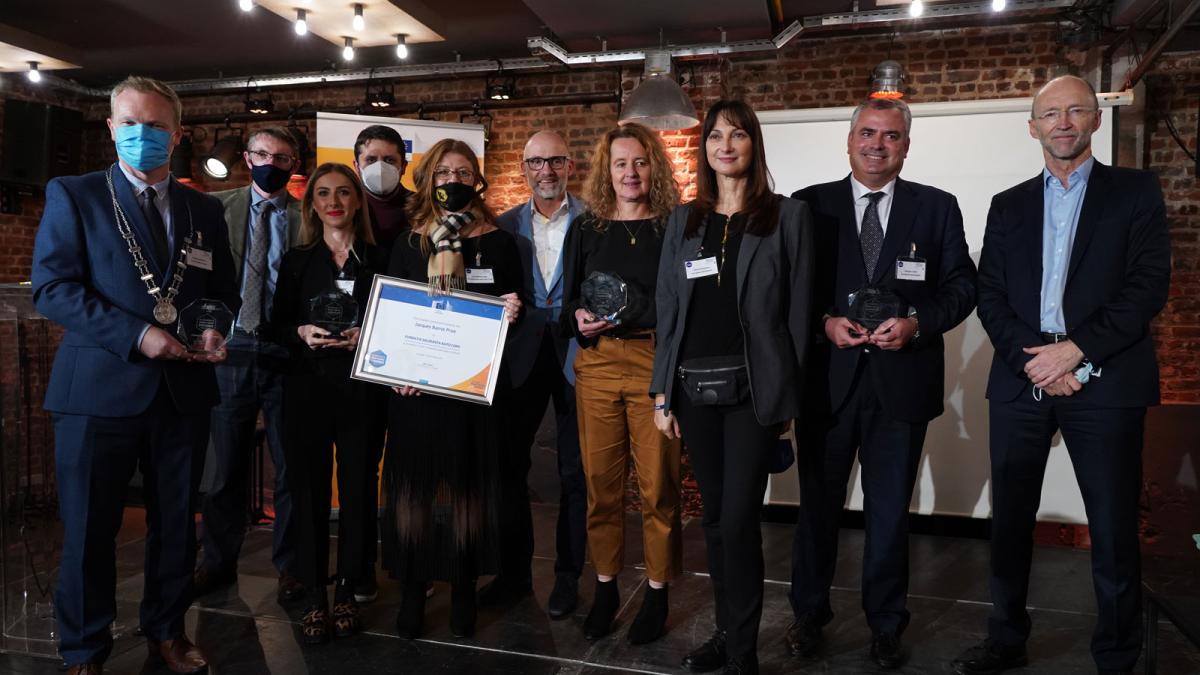A Romanian children’s car safety project and a Dutch music video helping to protect young cyclists were among the winners at this year’s Excellence in Road Safety Awards.
The awards recognise the contributions of the European Road Safety Charter's community of members towards the common goal of improved road safety across Europe. The five winning initiatives are examples of where organisations have delivered specific and measurable road safety actions in their areas of responsibility.
The winners in the four categories – associations, enterprises, local/ public authorities and schools/ universities were:
- Fundatia Siguranta Auto Copii (Romania) for its National Children Care Safety Caravan initiative
- Interpolis (the Netherlands) for its hip-hop film and PhoNo app targeting teenagers
- Cork County Council (Ireland) for its Road Safety Virtual Reality Education
- Fundacion Educatrafic (Spain) for its road safety training and education
Fundatia Siguranta Auto Copii was chosen by the audience at the awards ceremony this evening (18 November) to also receive the Jacques Barrot award. This special public choice prize has been awarded every year since 2016 to one of the winners and is dedicated to Jacques Barrot, a former European Commissioner for Transport.
Missed our awards? You can watch the recording here.
Associations
Fundatia Siguranta Auto Copii from Romania set out to tackle the country’s high fatality rates on the road and increase the low percentage of under 14-year-olds appropriately restrained in cars. The initiative, in conjunction with the Romanian traffic police and the Ministry of Transport, aims to educate the public, including young children, on travelling safely as passengers to help increase that percentage to 70% by 2025. The National Children Care Safety Caravan offers parents, caregivers and children free child car safety classes, car seat installation instructions and first aid training. The initiative uses a restrained versus an unrestrained dummy to simulate frontal impact and virtual reality googles to educate drivers on dangerous driving behaviours. Little Passenger Car Safety Week features a series of activities dedicated to children’s car safety. The project lends free baby shells to new parents and recycles used car seats to transform into children’s furniture. This green project, Green for Safety, donates the funds from auctioning the furniture to Children Trauma Centres in Romania where young victims of road accidents are treated. The initiative has already increased the use of child car seats from 24% in 2019 to 30% this year.
Enterprises
Interpolis from the Netherlands, addresses the challenge of educating teenagers not to use their mobile phones while riding bikes, and potentially, later when driving, via an emotional story portrayed in a music video from Dutch hip hop artist Snelle. Half of road accidents in the Netherlands involve cyclists and distraction is the biggest cause, mainly because of phones. This winning initiative aims to eliminate road accidents by 2050 by changing the attitude and behaviour of 14- to 17-year-olds, the most at-risk age group. Using focus groups and research, Interpolis discovered that teenagers respond best to safety messaging from their peers, parents and social media, and when it sits within popular teenage culture. In addition, Interpolis uses a mobile app, PhoNo, to educate young people to use their smartphones safely and for every mobile-free kilometre they ride with the PhoNo app, teenagers collect money for a Dutch foundation that cleans plastic from the Dutch beaches and North Sea. Insurance data shows that app users made 20% fewer damage claims than non-users.
Local/public authorities
Cork County Council from Ireland tackles road safety among young drivers, starting with 15-year-olds who have yet to get behind the wheel. The Road Safety Virtual Reality education model gives the learner an experience of what it is like to be involved in a road accident, the behaviour in a car that can lead to an accident, and how to respond to an accident safely. Almost nine in 10 participants said that having had this type of education they would think twice about how they would behave in the future as a driver, passenger or pedestrian. The model has subsequently been used for water safety education and complements events with the fire service, An Garda Siochana (police) and the National Ambulance Service Blue Light education events to highlight key road safety messages. Organisers said the key to the success of the initiative was to think outside the box, keep things fresh and look for new ways of educating people at all times.
Schools/ universities
Fundacion Educatrafic from Spain designed practical training in the safe use of electric scooters, skateboards and personal mobility vehicles to reduce the high percentage of related accidents. Fundación Educatrafic targets people from the age of 16 and the training takes place in a controlled area to safely simulate an open road environment. Multiple scenarios are experienced using simulation goggles, from alcohol and drug use to balance tests. Talks were developed on emotional education concepts, including emotional intelligence and self-control, empathy and assertiveness, moods and driving – with a focus on ‘what is road safety?’ – traffic rules, the main causes of accidents, responsibility and positive habits. The Aragonese Association of Psychopedagogy, the General Directorate of Traffic and K Driving Schools all participated in the project.
Matthew Baldwin, Deputy Director General DG MOVE, European Commission and European Road Safety Coordinator : “We warmly congratulate our worthy award winners and thank everyone who submitted an application for their commendable achievements towards improving road safety in Europe. Everyone has a role to play in making our roads safer –, clubs, associations, schools, companies, public authorities at all levels, and every one of us. I hope that these excellent projects will inspire others around Europe and look forward to making real progress together towards Vision Zero.”
Information on the 2022 Excellence in Road Safety awards will be announced in the coming months.
If you feel inspired and are not yet a member of the European Road Safety Charter, you can join here.
